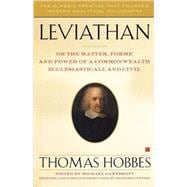
Note: Supplemental materials are not guaranteed with Rental or Used book purchases.
Purchase Benefits
| Introduction | |
| Author's Introduction | |
| The First Part/Of Man | |
| Of Sense | |
| Of Imagination | |
| Of the Consequence or Train of Imaginations | |
| Of Speech | |
| Of Reason and Science | |
| Of the Interior Beginnings of Voluntary Motions, commonly called the Passions; and the Speeches by which they are expressed | |
| Of the Ends or Resolutions of Discourse | |
| Of the Virtues, commonly called Intellectual; and their contrary Defects | |
| Of the Several Subjects of Knowledge | |
| Of Power, Worth, Dignity, Honour, and Worthiness | |
| Of the Difference of Manners | |
| Of Religion | |
| Of the Natural Condition of Mankind as concerning their Felicity and Misery | |
| Of the First and Second Natural Laws, and of Contracts | |
| Of other Laws of Nature | |
| Of Persons, Authors, and Things PersonatedThe Second Part /Of Commonwealth | |
| Of the Causes, Generation, and Definition of a Commonwealth | |
| Of the Rights of Sovereigns by Institution | |
| Of the several kinds of Commonwealth by Institution; and of Succession to the Sovereign Power | |
| Of Dominion Paternal, and Despotical | |
| Of the Liberty of Subjects | |
| Of Systems Subject, Political, and Private | |
| Of the Public Ministers of Sovereign Power | |
| Of the Nutrition, and Procreation of a Commonwealth | |
| Of Counsel | |
| Of Civil Laws | |
| Of Crimes, Excuses, and Extenuations | |
| Of Punishments, and Rewards | |
| Of those things that weaken, or tend to the Dissolution of a Commonwealth | |
| Of the Office of the Sovereign Representative | |
| Of the Kingdom of God by NatureThe Third Part /Of a Christian Commonwealth | |
| Of the Principles of Christian Politics | |
| Of the Number, Antiquity, Scope, Authority, and Interpreters of the Books of Holy Scripture | |
| Of the Signification of Spirit, Angel, and Inspiration, in the Books of Holy Scripture | |
| Of the Signification in Scripture of the Kingdom of God, of Holy, Sacred, and Sacrament | |
| Of the Word of God, and of Prophets | |
| Of Miracles, and their Use | |
| Of the Signification in Scripture of Eternal Life, Hell, Salvation, the World to Come, and Redemption | |
| Of the Signification in Scripture of the word Church | |
| Of the Rights of the Kingdom of God, in Abraham, Moses, the High-Priests, and the Kings of Judah | |
| Of the Office of Our Blessed Saviour | |
| Of Power Ecclesiastical | |
| Of what is Necessary for a Man's Reception into the Kingdom of HeavenThe Fourth Part /Of the Kingdom of Darkness | |
| Of Spiritual Darkness, from Misinterpretation of Scripture | |
| Of Demonology, and other Relics of the Religion of the Gentiles | |
| Of Darkness from Vain Philosophy, and Fabulous Traditions | |
| Of the Benefit that proceedeth from such Darkness; and to whom it accrueth | |
| A Review, and | |
| Conclusion | |
| Table of Contents provided by Publisher. All Rights Reserved. |
The New copy of this book will include any supplemental materials advertised. Please check the title of the book to determine if it should include any access cards, study guides, lab manuals, CDs, etc.
The Used, Rental and eBook copies of this book are not guaranteed to include any supplemental materials. Typically, only the book itself is included. This is true even if the title states it includes any access cards, study guides, lab manuals, CDs, etc.